Business and Corporate Law
VerifiedAdded on 2023/01/23
|9
|2452
|50
AI Summary
This article discusses the liability of a company for the actions of its employees and the obligations of an agent towards the principal in business and corporate law. It also explores the assumptions that can be made in contracts entered into by incorporated companies.
Contribute Materials
Your contribution can guide someone’s learning journey. Share your
documents today.
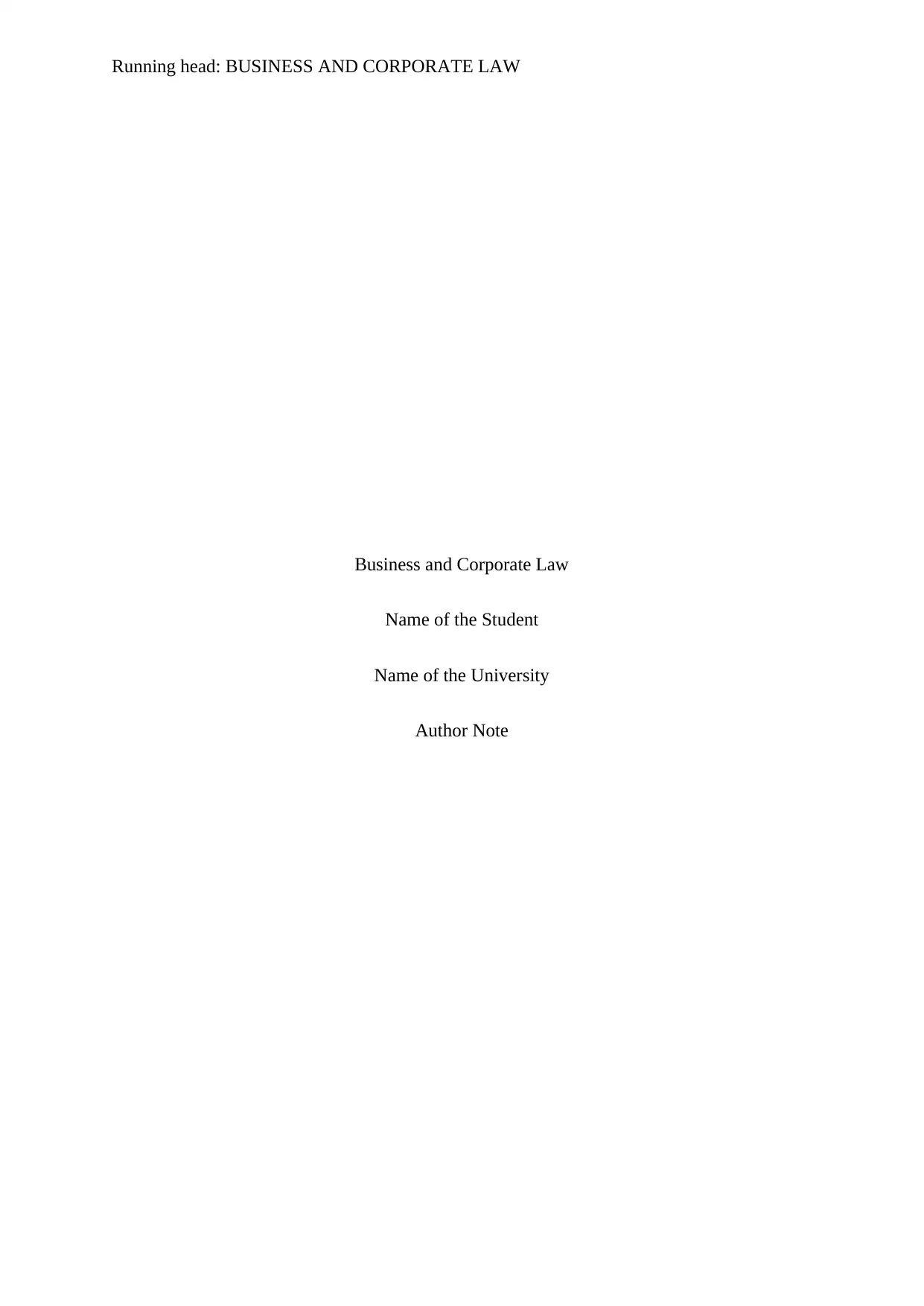
Running head: BUSINESS AND CORPORATE LAW
Business and Corporate Law
Name of the Student
Name of the University
Author Note
Business and Corporate Law
Name of the Student
Name of the University
Author Note
Secure Best Marks with AI Grader
Need help grading? Try our AI Grader for instant feedback on your assignments.
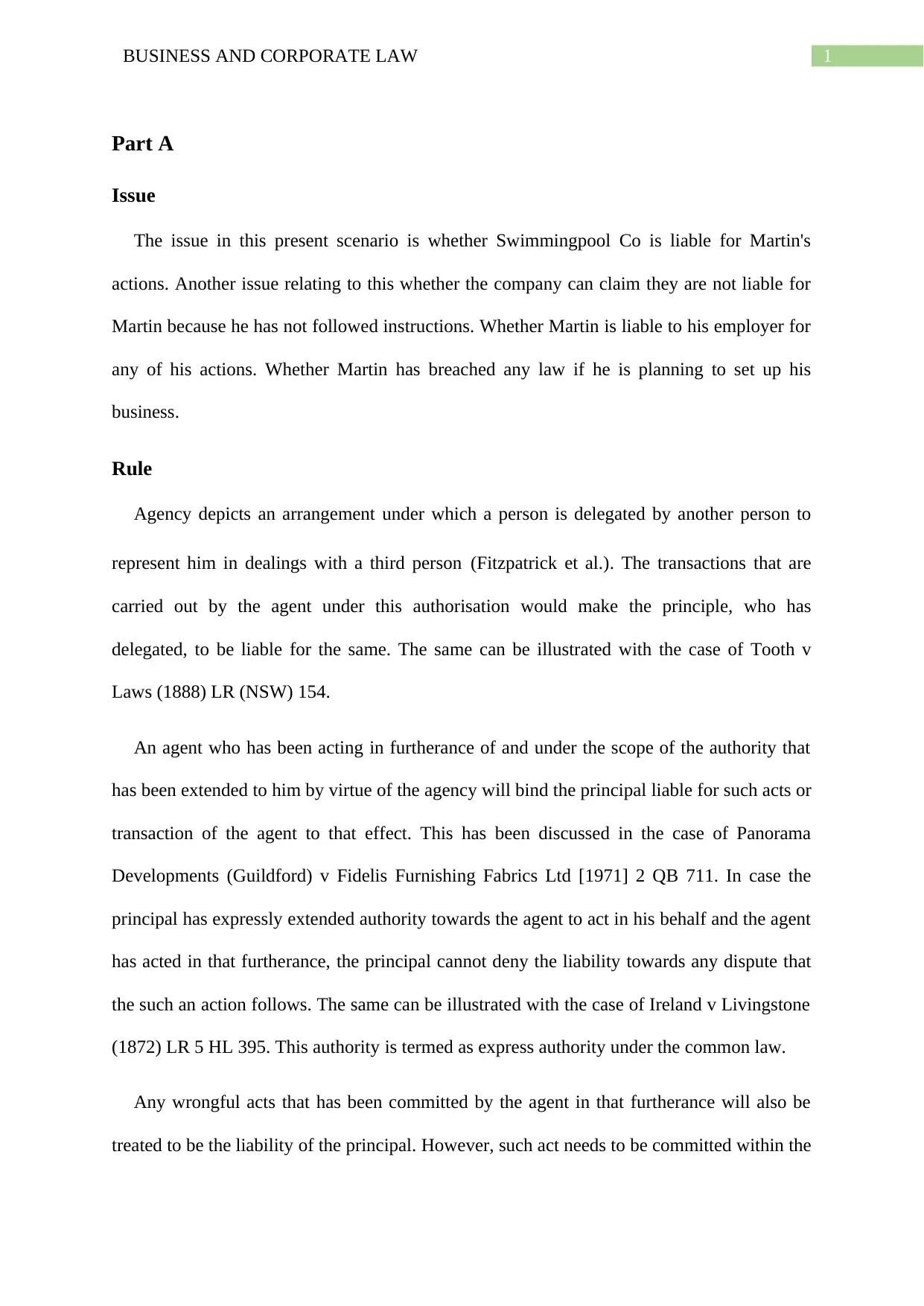
1BUSINESS AND CORPORATE LAW
Part A
Issue
The issue in this present scenario is whether Swimmingpool Co is liable for Martin's
actions. Another issue relating to this whether the company can claim they are not liable for
Martin because he has not followed instructions. Whether Martin is liable to his employer for
any of his actions. Whether Martin has breached any law if he is planning to set up his
business.
Rule
Agency depicts an arrangement under which a person is delegated by another person to
represent him in dealings with a third person (Fitzpatrick et al.). The transactions that are
carried out by the agent under this authorisation would make the principle, who has
delegated, to be liable for the same. The same can be illustrated with the case of Tooth v
Laws (1888) LR (NSW) 154.
An agent who has been acting in furtherance of and under the scope of the authority that
has been extended to him by virtue of the agency will bind the principal liable for such acts or
transaction of the agent to that effect. This has been discussed in the case of Panorama
Developments (Guildford) v Fidelis Furnishing Fabrics Ltd [1971] 2 QB 711. In case the
principal has expressly extended authority towards the agent to act in his behalf and the agent
has acted in that furtherance, the principal cannot deny the liability towards any dispute that
the such an action follows. The same can be illustrated with the case of Ireland v Livingstone
(1872) LR 5 HL 395. This authority is termed as express authority under the common law.
Any wrongful acts that has been committed by the agent in that furtherance will also be
treated to be the liability of the principal. However, such act needs to be committed within the
Part A
Issue
The issue in this present scenario is whether Swimmingpool Co is liable for Martin's
actions. Another issue relating to this whether the company can claim they are not liable for
Martin because he has not followed instructions. Whether Martin is liable to his employer for
any of his actions. Whether Martin has breached any law if he is planning to set up his
business.
Rule
Agency depicts an arrangement under which a person is delegated by another person to
represent him in dealings with a third person (Fitzpatrick et al.). The transactions that are
carried out by the agent under this authorisation would make the principle, who has
delegated, to be liable for the same. The same can be illustrated with the case of Tooth v
Laws (1888) LR (NSW) 154.
An agent who has been acting in furtherance of and under the scope of the authority that
has been extended to him by virtue of the agency will bind the principal liable for such acts or
transaction of the agent to that effect. This has been discussed in the case of Panorama
Developments (Guildford) v Fidelis Furnishing Fabrics Ltd [1971] 2 QB 711. In case the
principal has expressly extended authority towards the agent to act in his behalf and the agent
has acted in that furtherance, the principal cannot deny the liability towards any dispute that
the such an action follows. The same can be illustrated with the case of Ireland v Livingstone
(1872) LR 5 HL 395. This authority is termed as express authority under the common law.
Any wrongful acts that has been committed by the agent in that furtherance will also be
treated to be the liability of the principal. However, such act needs to be committed within the
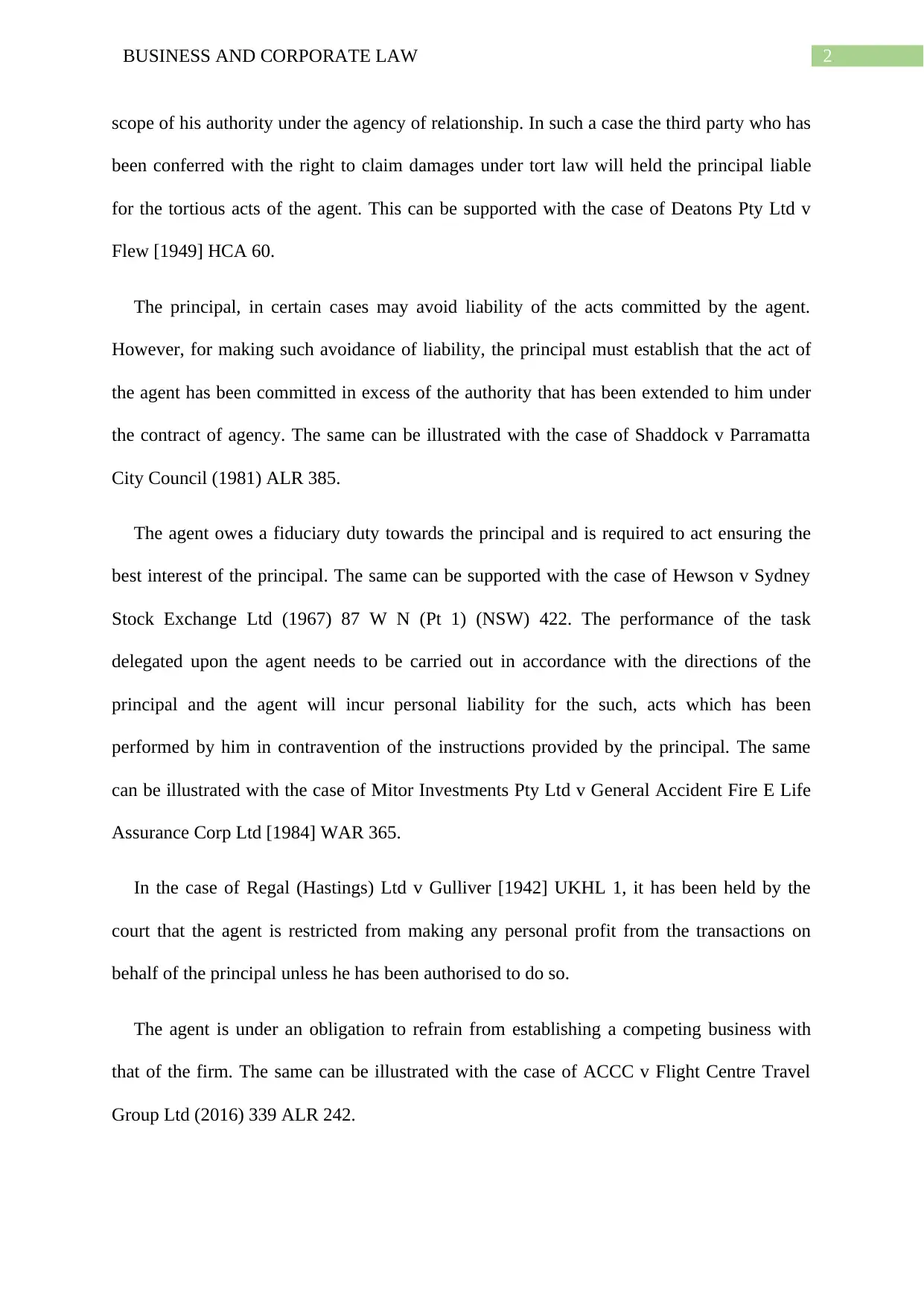
2BUSINESS AND CORPORATE LAW
scope of his authority under the agency of relationship. In such a case the third party who has
been conferred with the right to claim damages under tort law will held the principal liable
for the tortious acts of the agent. This can be supported with the case of Deatons Pty Ltd v
Flew [1949] HCA 60.
The principal, in certain cases may avoid liability of the acts committed by the agent.
However, for making such avoidance of liability, the principal must establish that the act of
the agent has been committed in excess of the authority that has been extended to him under
the contract of agency. The same can be illustrated with the case of Shaddock v Parramatta
City Council (1981) ALR 385.
The agent owes a fiduciary duty towards the principal and is required to act ensuring the
best interest of the principal. The same can be supported with the case of Hewson v Sydney
Stock Exchange Ltd (1967) 87 W N (Pt 1) (NSW) 422. The performance of the task
delegated upon the agent needs to be carried out in accordance with the directions of the
principal and the agent will incur personal liability for the such, acts which has been
performed by him in contravention of the instructions provided by the principal. The same
can be illustrated with the case of Mitor Investments Pty Ltd v General Accident Fire E Life
Assurance Corp Ltd [1984] WAR 365.
In the case of Regal (Hastings) Ltd v Gulliver [1942] UKHL 1, it has been held by the
court that the agent is restricted from making any personal profit from the transactions on
behalf of the principal unless he has been authorised to do so.
The agent is under an obligation to refrain from establishing a competing business with
that of the firm. The same can be illustrated with the case of ACCC v Flight Centre Travel
Group Ltd (2016) 339 ALR 242.
scope of his authority under the agency of relationship. In such a case the third party who has
been conferred with the right to claim damages under tort law will held the principal liable
for the tortious acts of the agent. This can be supported with the case of Deatons Pty Ltd v
Flew [1949] HCA 60.
The principal, in certain cases may avoid liability of the acts committed by the agent.
However, for making such avoidance of liability, the principal must establish that the act of
the agent has been committed in excess of the authority that has been extended to him under
the contract of agency. The same can be illustrated with the case of Shaddock v Parramatta
City Council (1981) ALR 385.
The agent owes a fiduciary duty towards the principal and is required to act ensuring the
best interest of the principal. The same can be supported with the case of Hewson v Sydney
Stock Exchange Ltd (1967) 87 W N (Pt 1) (NSW) 422. The performance of the task
delegated upon the agent needs to be carried out in accordance with the directions of the
principal and the agent will incur personal liability for the such, acts which has been
performed by him in contravention of the instructions provided by the principal. The same
can be illustrated with the case of Mitor Investments Pty Ltd v General Accident Fire E Life
Assurance Corp Ltd [1984] WAR 365.
In the case of Regal (Hastings) Ltd v Gulliver [1942] UKHL 1, it has been held by the
court that the agent is restricted from making any personal profit from the transactions on
behalf of the principal unless he has been authorised to do so.
The agent is under an obligation to refrain from establishing a competing business with
that of the firm. The same can be illustrated with the case of ACCC v Flight Centre Travel
Group Ltd (2016) 339 ALR 242.
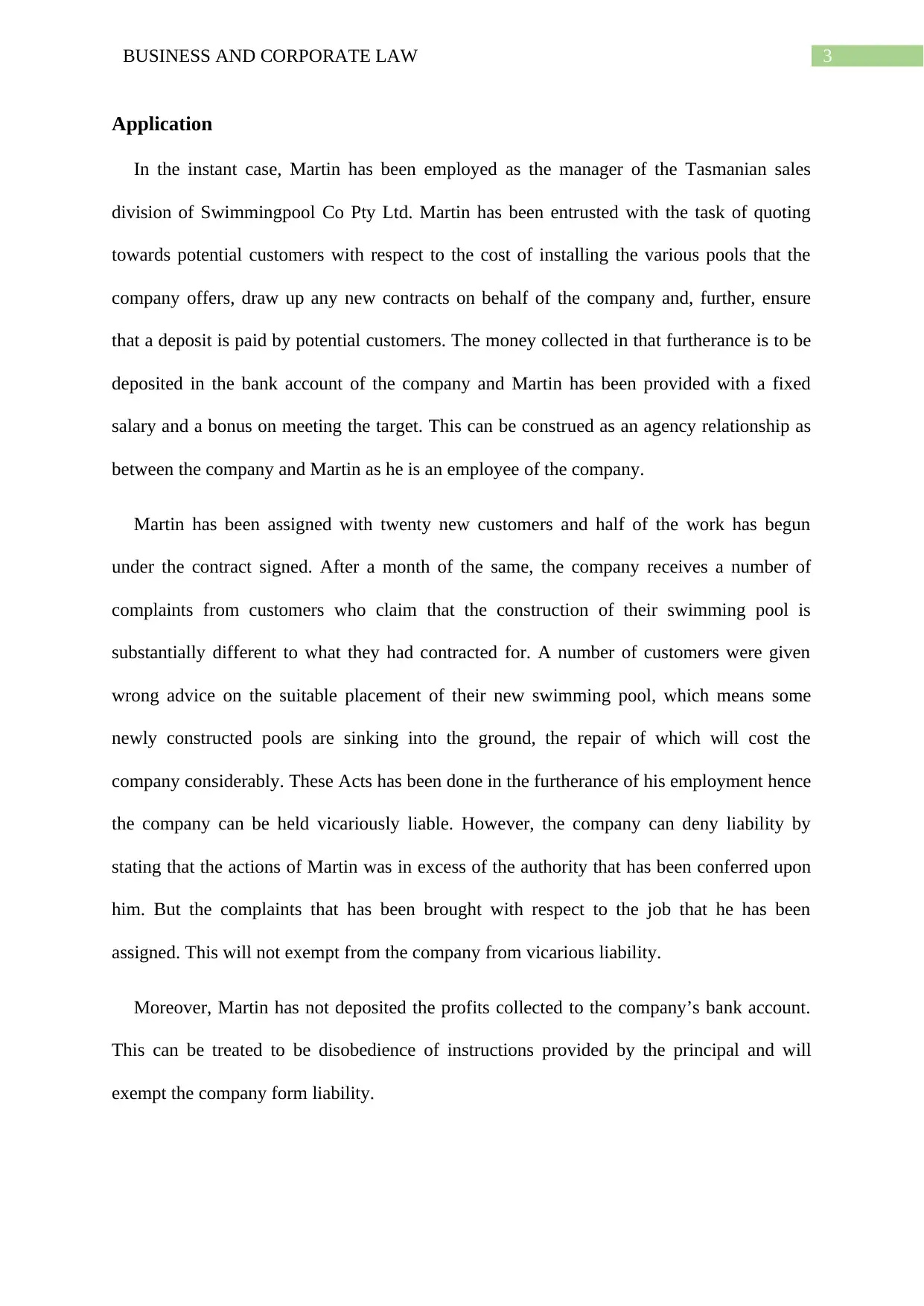
3BUSINESS AND CORPORATE LAW
Application
In the instant case, Martin has been employed as the manager of the Tasmanian sales
division of Swimmingpool Co Pty Ltd. Martin has been entrusted with the task of quoting
towards potential customers with respect to the cost of installing the various pools that the
company offers, draw up any new contracts on behalf of the company and, further, ensure
that a deposit is paid by potential customers. The money collected in that furtherance is to be
deposited in the bank account of the company and Martin has been provided with a fixed
salary and a bonus on meeting the target. This can be construed as an agency relationship as
between the company and Martin as he is an employee of the company.
Martin has been assigned with twenty new customers and half of the work has begun
under the contract signed. After a month of the same, the company receives a number of
complaints from customers who claim that the construction of their swimming pool is
substantially different to what they had contracted for. A number of customers were given
wrong advice on the suitable placement of their new swimming pool, which means some
newly constructed pools are sinking into the ground, the repair of which will cost the
company considerably. These Acts has been done in the furtherance of his employment hence
the company can be held vicariously liable. However, the company can deny liability by
stating that the actions of Martin was in excess of the authority that has been conferred upon
him. But the complaints that has been brought with respect to the job that he has been
assigned. This will not exempt from the company from vicarious liability.
Moreover, Martin has not deposited the profits collected to the company’s bank account.
This can be treated to be disobedience of instructions provided by the principal and will
exempt the company form liability.
Application
In the instant case, Martin has been employed as the manager of the Tasmanian sales
division of Swimmingpool Co Pty Ltd. Martin has been entrusted with the task of quoting
towards potential customers with respect to the cost of installing the various pools that the
company offers, draw up any new contracts on behalf of the company and, further, ensure
that a deposit is paid by potential customers. The money collected in that furtherance is to be
deposited in the bank account of the company and Martin has been provided with a fixed
salary and a bonus on meeting the target. This can be construed as an agency relationship as
between the company and Martin as he is an employee of the company.
Martin has been assigned with twenty new customers and half of the work has begun
under the contract signed. After a month of the same, the company receives a number of
complaints from customers who claim that the construction of their swimming pool is
substantially different to what they had contracted for. A number of customers were given
wrong advice on the suitable placement of their new swimming pool, which means some
newly constructed pools are sinking into the ground, the repair of which will cost the
company considerably. These Acts has been done in the furtherance of his employment hence
the company can be held vicariously liable. However, the company can deny liability by
stating that the actions of Martin was in excess of the authority that has been conferred upon
him. But the complaints that has been brought with respect to the job that he has been
assigned. This will not exempt from the company from vicarious liability.
Moreover, Martin has not deposited the profits collected to the company’s bank account.
This can be treated to be disobedience of instructions provided by the principal and will
exempt the company form liability.
Paraphrase This Document
Need a fresh take? Get an instant paraphrase of this document with our AI Paraphraser
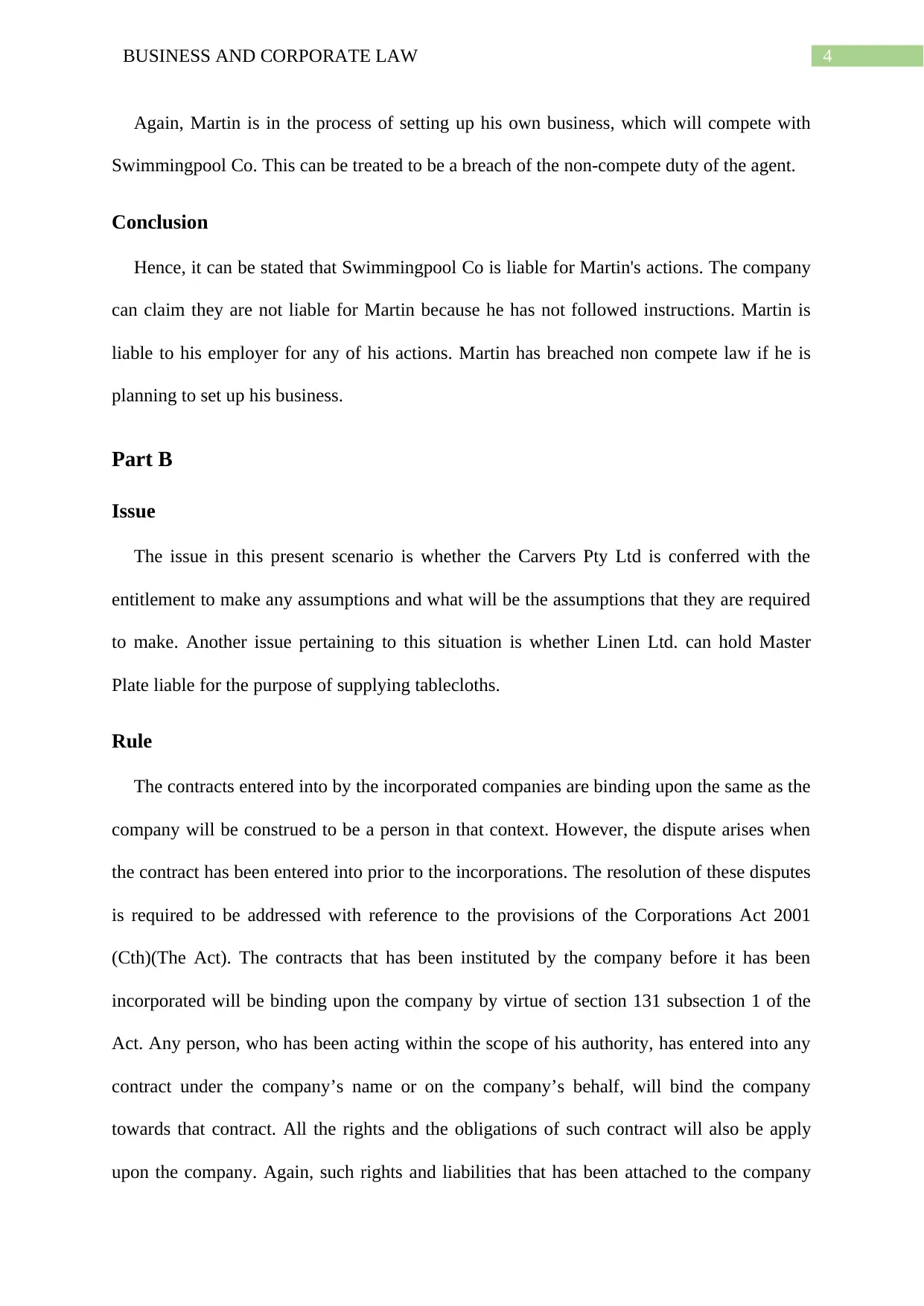
4BUSINESS AND CORPORATE LAW
Again, Martin is in the process of setting up his own business, which will compete with
Swimmingpool Co. This can be treated to be a breach of the non-compete duty of the agent.
Conclusion
Hence, it can be stated that Swimmingpool Co is liable for Martin's actions. The company
can claim they are not liable for Martin because he has not followed instructions. Martin is
liable to his employer for any of his actions. Martin has breached non compete law if he is
planning to set up his business.
Part B
Issue
The issue in this present scenario is whether the Carvers Pty Ltd is conferred with the
entitlement to make any assumptions and what will be the assumptions that they are required
to make. Another issue pertaining to this situation is whether Linen Ltd. can hold Master
Plate liable for the purpose of supplying tablecloths.
Rule
The contracts entered into by the incorporated companies are binding upon the same as the
company will be construed to be a person in that context. However, the dispute arises when
the contract has been entered into prior to the incorporations. The resolution of these disputes
is required to be addressed with reference to the provisions of the Corporations Act 2001
(Cth)(The Act). The contracts that has been instituted by the company before it has been
incorporated will be binding upon the company by virtue of section 131 subsection 1 of the
Act. Any person, who has been acting within the scope of his authority, has entered into any
contract under the company’s name or on the company’s behalf, will bind the company
towards that contract. All the rights and the obligations of such contract will also be apply
upon the company. Again, such rights and liabilities that has been attached to the company
Again, Martin is in the process of setting up his own business, which will compete with
Swimmingpool Co. This can be treated to be a breach of the non-compete duty of the agent.
Conclusion
Hence, it can be stated that Swimmingpool Co is liable for Martin's actions. The company
can claim they are not liable for Martin because he has not followed instructions. Martin is
liable to his employer for any of his actions. Martin has breached non compete law if he is
planning to set up his business.
Part B
Issue
The issue in this present scenario is whether the Carvers Pty Ltd is conferred with the
entitlement to make any assumptions and what will be the assumptions that they are required
to make. Another issue pertaining to this situation is whether Linen Ltd. can hold Master
Plate liable for the purpose of supplying tablecloths.
Rule
The contracts entered into by the incorporated companies are binding upon the same as the
company will be construed to be a person in that context. However, the dispute arises when
the contract has been entered into prior to the incorporations. The resolution of these disputes
is required to be addressed with reference to the provisions of the Corporations Act 2001
(Cth)(The Act). The contracts that has been instituted by the company before it has been
incorporated will be binding upon the company by virtue of section 131 subsection 1 of the
Act. Any person, who has been acting within the scope of his authority, has entered into any
contract under the company’s name or on the company’s behalf, will bind the company
towards that contract. All the rights and the obligations of such contract will also be apply
upon the company. Again, such rights and liabilities that has been attached to the company
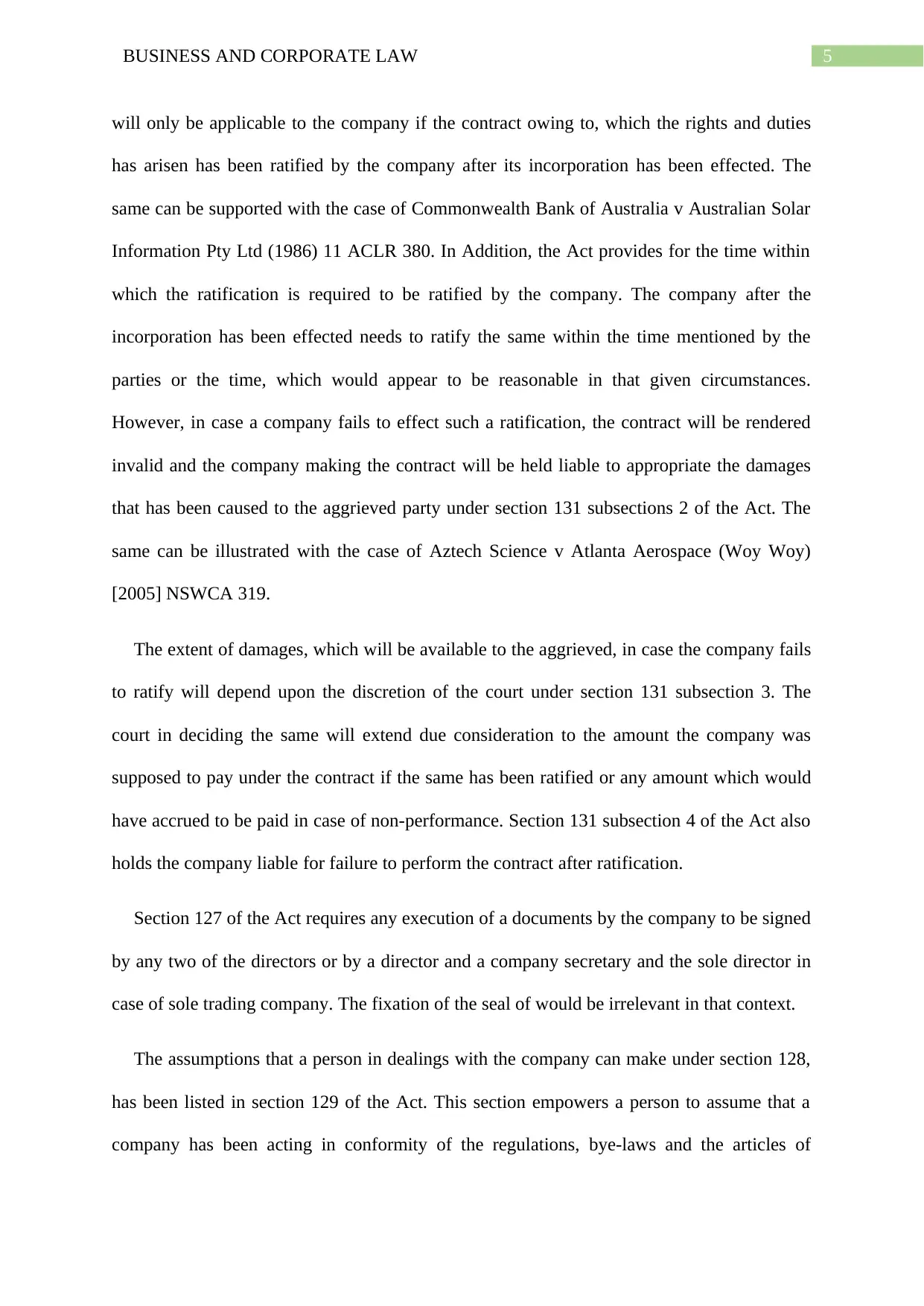
5BUSINESS AND CORPORATE LAW
will only be applicable to the company if the contract owing to, which the rights and duties
has arisen has been ratified by the company after its incorporation has been effected. The
same can be supported with the case of Commonwealth Bank of Australia v Australian Solar
Information Pty Ltd (1986) 11 ACLR 380. In Addition, the Act provides for the time within
which the ratification is required to be ratified by the company. The company after the
incorporation has been effected needs to ratify the same within the time mentioned by the
parties or the time, which would appear to be reasonable in that given circumstances.
However, in case a company fails to effect such a ratification, the contract will be rendered
invalid and the company making the contract will be held liable to appropriate the damages
that has been caused to the aggrieved party under section 131 subsections 2 of the Act. The
same can be illustrated with the case of Aztech Science v Atlanta Aerospace (Woy Woy)
[2005] NSWCA 319.
The extent of damages, which will be available to the aggrieved, in case the company fails
to ratify will depend upon the discretion of the court under section 131 subsection 3. The
court in deciding the same will extend due consideration to the amount the company was
supposed to pay under the contract if the same has been ratified or any amount which would
have accrued to be paid in case of non-performance. Section 131 subsection 4 of the Act also
holds the company liable for failure to perform the contract after ratification.
Section 127 of the Act requires any execution of a documents by the company to be signed
by any two of the directors or by a director and a company secretary and the sole director in
case of sole trading company. The fixation of the seal of would be irrelevant in that context.
The assumptions that a person in dealings with the company can make under section 128,
has been listed in section 129 of the Act. This section empowers a person to assume that a
company has been acting in conformity of the regulations, bye-laws and the articles of
will only be applicable to the company if the contract owing to, which the rights and duties
has arisen has been ratified by the company after its incorporation has been effected. The
same can be supported with the case of Commonwealth Bank of Australia v Australian Solar
Information Pty Ltd (1986) 11 ACLR 380. In Addition, the Act provides for the time within
which the ratification is required to be ratified by the company. The company after the
incorporation has been effected needs to ratify the same within the time mentioned by the
parties or the time, which would appear to be reasonable in that given circumstances.
However, in case a company fails to effect such a ratification, the contract will be rendered
invalid and the company making the contract will be held liable to appropriate the damages
that has been caused to the aggrieved party under section 131 subsections 2 of the Act. The
same can be illustrated with the case of Aztech Science v Atlanta Aerospace (Woy Woy)
[2005] NSWCA 319.
The extent of damages, which will be available to the aggrieved, in case the company fails
to ratify will depend upon the discretion of the court under section 131 subsection 3. The
court in deciding the same will extend due consideration to the amount the company was
supposed to pay under the contract if the same has been ratified or any amount which would
have accrued to be paid in case of non-performance. Section 131 subsection 4 of the Act also
holds the company liable for failure to perform the contract after ratification.
Section 127 of the Act requires any execution of a documents by the company to be signed
by any two of the directors or by a director and a company secretary and the sole director in
case of sole trading company. The fixation of the seal of would be irrelevant in that context.
The assumptions that a person in dealings with the company can make under section 128,
has been listed in section 129 of the Act. This section empowers a person to assume that a
company has been acting in conformity of the regulations, bye-laws and the articles of
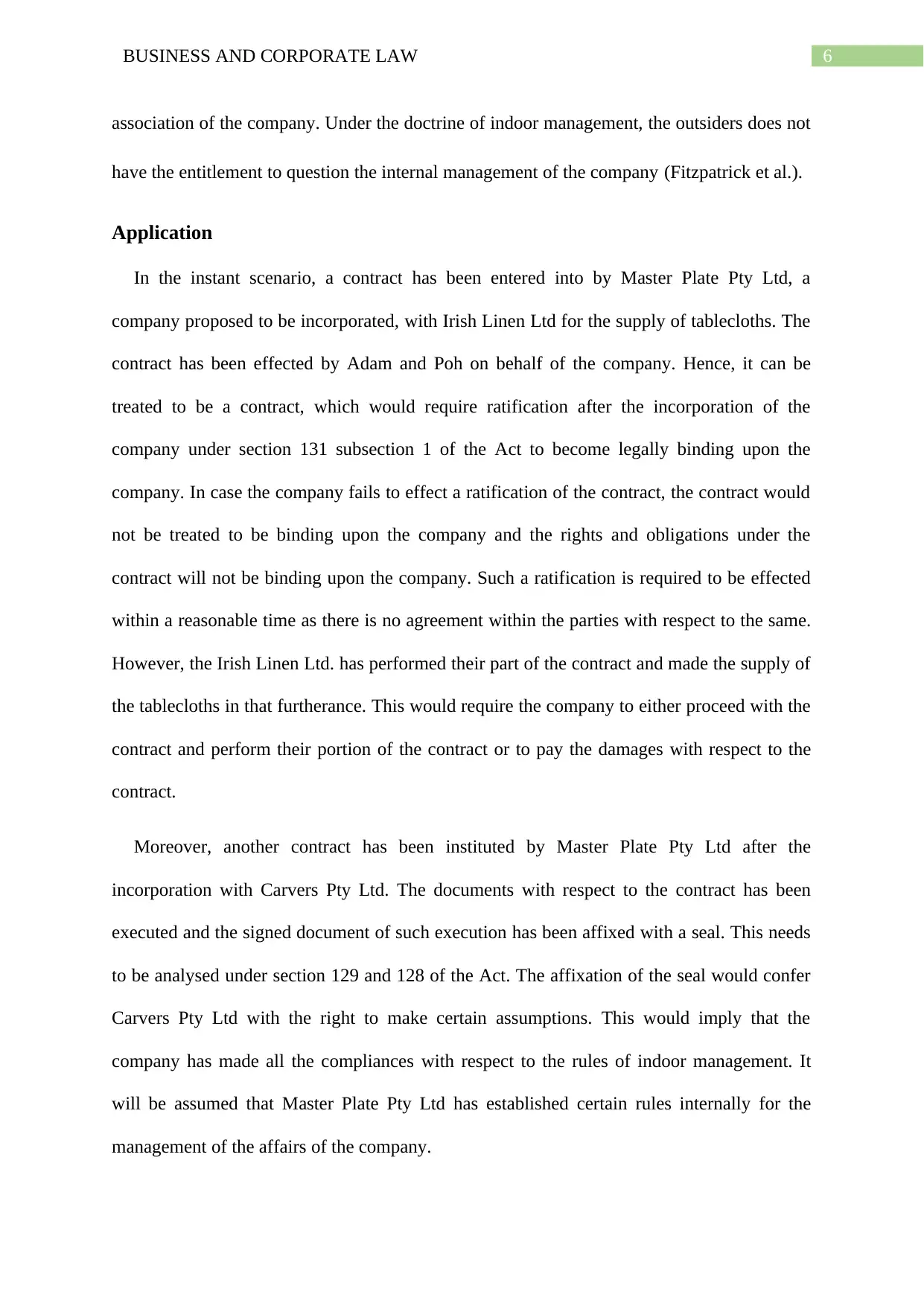
6BUSINESS AND CORPORATE LAW
association of the company. Under the doctrine of indoor management, the outsiders does not
have the entitlement to question the internal management of the company (Fitzpatrick et al.).
Application
In the instant scenario, a contract has been entered into by Master Plate Pty Ltd, a
company proposed to be incorporated, with Irish Linen Ltd for the supply of tablecloths. The
contract has been effected by Adam and Poh on behalf of the company. Hence, it can be
treated to be a contract, which would require ratification after the incorporation of the
company under section 131 subsection 1 of the Act to become legally binding upon the
company. In case the company fails to effect a ratification of the contract, the contract would
not be treated to be binding upon the company and the rights and obligations under the
contract will not be binding upon the company. Such a ratification is required to be effected
within a reasonable time as there is no agreement within the parties with respect to the same.
However, the Irish Linen Ltd. has performed their part of the contract and made the supply of
the tablecloths in that furtherance. This would require the company to either proceed with the
contract and perform their portion of the contract or to pay the damages with respect to the
contract.
Moreover, another contract has been instituted by Master Plate Pty Ltd after the
incorporation with Carvers Pty Ltd. The documents with respect to the contract has been
executed and the signed document of such execution has been affixed with a seal. This needs
to be analysed under section 129 and 128 of the Act. The affixation of the seal would confer
Carvers Pty Ltd with the right to make certain assumptions. This would imply that the
company has made all the compliances with respect to the rules of indoor management. It
will be assumed that Master Plate Pty Ltd has established certain rules internally for the
management of the affairs of the company.
association of the company. Under the doctrine of indoor management, the outsiders does not
have the entitlement to question the internal management of the company (Fitzpatrick et al.).
Application
In the instant scenario, a contract has been entered into by Master Plate Pty Ltd, a
company proposed to be incorporated, with Irish Linen Ltd for the supply of tablecloths. The
contract has been effected by Adam and Poh on behalf of the company. Hence, it can be
treated to be a contract, which would require ratification after the incorporation of the
company under section 131 subsection 1 of the Act to become legally binding upon the
company. In case the company fails to effect a ratification of the contract, the contract would
not be treated to be binding upon the company and the rights and obligations under the
contract will not be binding upon the company. Such a ratification is required to be effected
within a reasonable time as there is no agreement within the parties with respect to the same.
However, the Irish Linen Ltd. has performed their part of the contract and made the supply of
the tablecloths in that furtherance. This would require the company to either proceed with the
contract and perform their portion of the contract or to pay the damages with respect to the
contract.
Moreover, another contract has been instituted by Master Plate Pty Ltd after the
incorporation with Carvers Pty Ltd. The documents with respect to the contract has been
executed and the signed document of such execution has been affixed with a seal. This needs
to be analysed under section 129 and 128 of the Act. The affixation of the seal would confer
Carvers Pty Ltd with the right to make certain assumptions. This would imply that the
company has made all the compliances with respect to the rules of indoor management. It
will be assumed that Master Plate Pty Ltd has established certain rules internally for the
management of the affairs of the company.
Secure Best Marks with AI Grader
Need help grading? Try our AI Grader for instant feedback on your assignments.
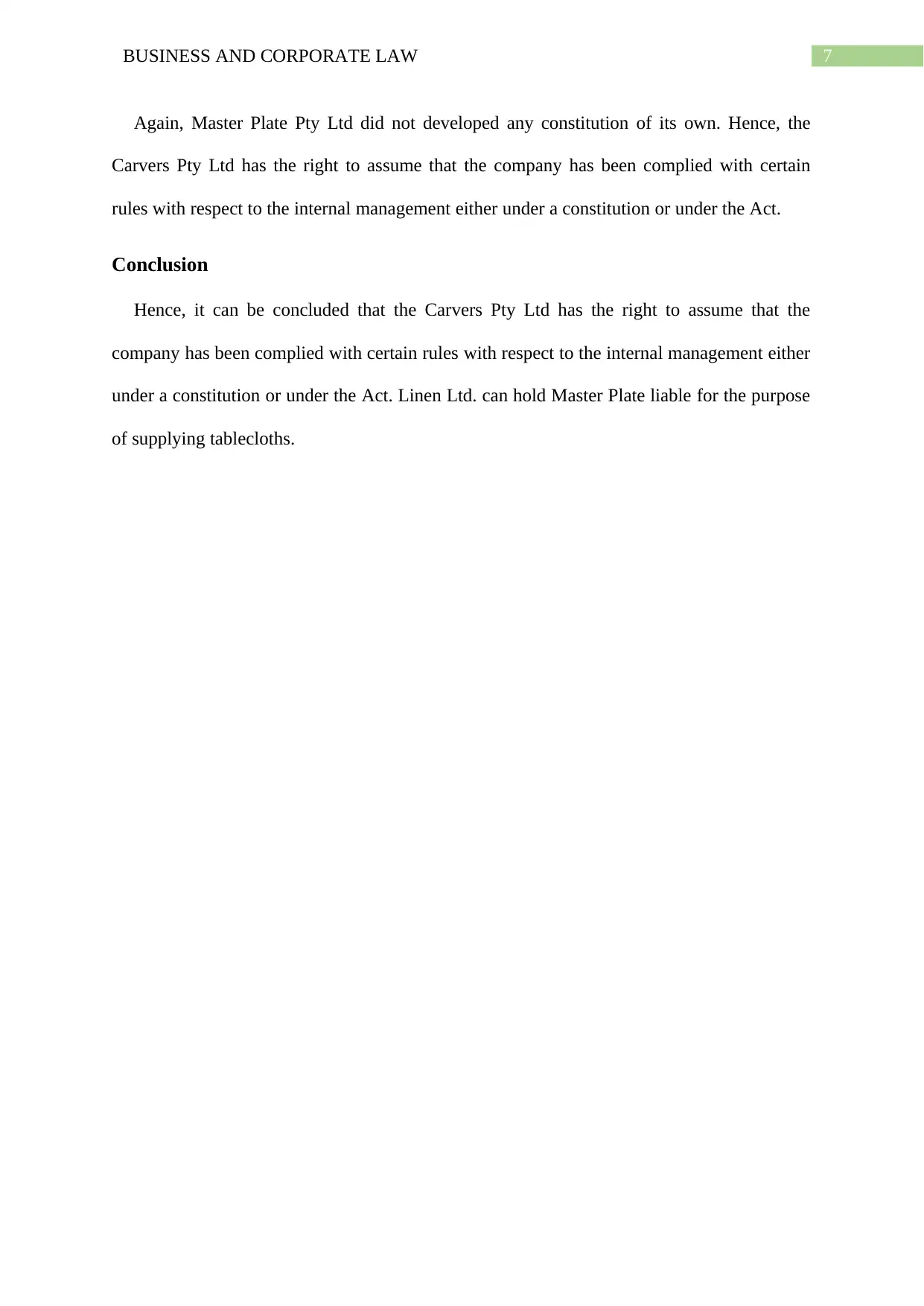
7BUSINESS AND CORPORATE LAW
Again, Master Plate Pty Ltd did not developed any constitution of its own. Hence, the
Carvers Pty Ltd has the right to assume that the company has been complied with certain
rules with respect to the internal management either under a constitution or under the Act.
Conclusion
Hence, it can be concluded that the Carvers Pty Ltd has the right to assume that the
company has been complied with certain rules with respect to the internal management either
under a constitution or under the Act. Linen Ltd. can hold Master Plate liable for the purpose
of supplying tablecloths.
Again, Master Plate Pty Ltd did not developed any constitution of its own. Hence, the
Carvers Pty Ltd has the right to assume that the company has been complied with certain
rules with respect to the internal management either under a constitution or under the Act.
Conclusion
Hence, it can be concluded that the Carvers Pty Ltd has the right to assume that the
company has been complied with certain rules with respect to the internal management either
under a constitution or under the Act. Linen Ltd. can hold Master Plate liable for the purpose
of supplying tablecloths.
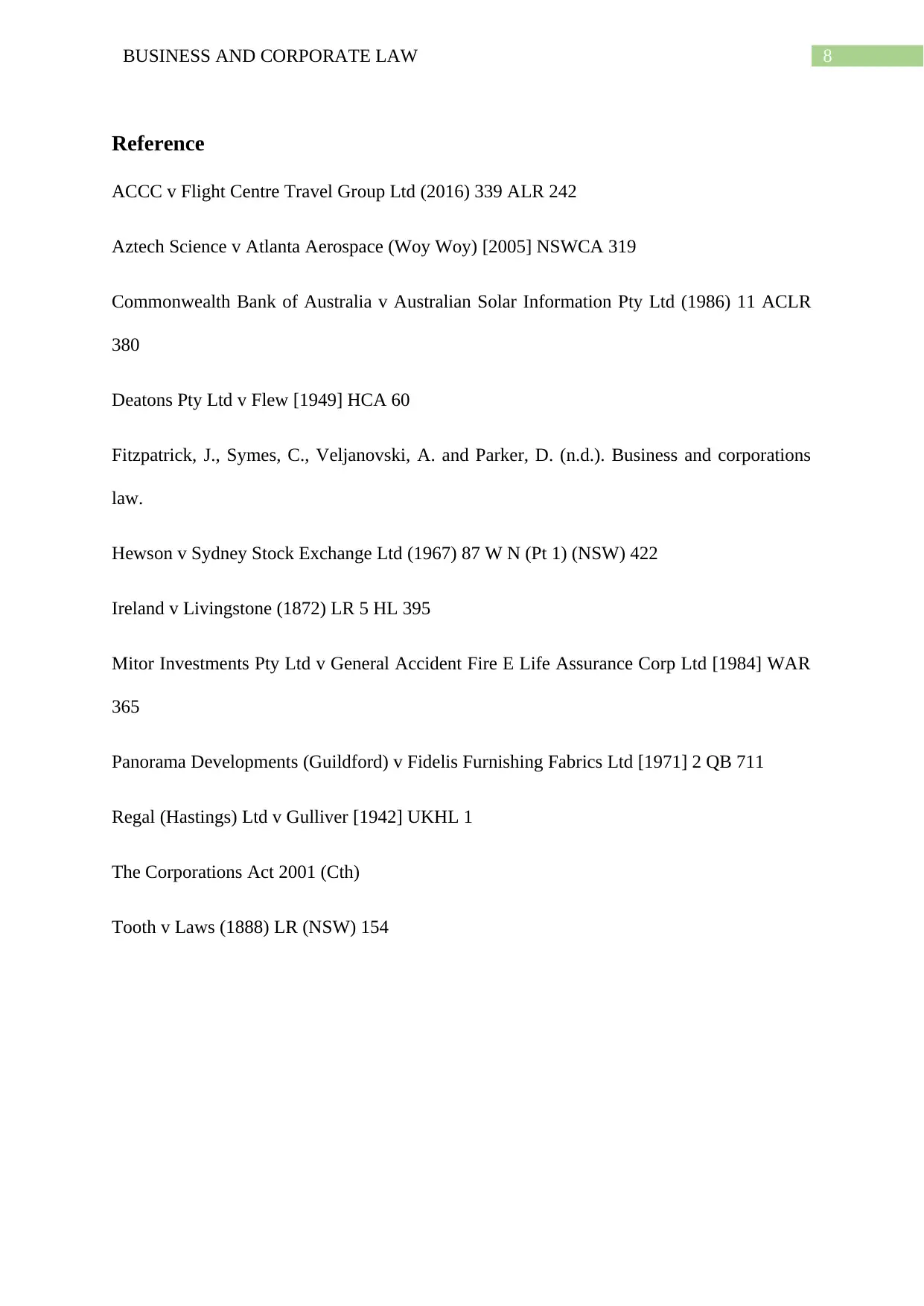
8BUSINESS AND CORPORATE LAW
Reference
ACCC v Flight Centre Travel Group Ltd (2016) 339 ALR 242
Aztech Science v Atlanta Aerospace (Woy Woy) [2005] NSWCA 319
Commonwealth Bank of Australia v Australian Solar Information Pty Ltd (1986) 11 ACLR
380
Deatons Pty Ltd v Flew [1949] HCA 60
Fitzpatrick, J., Symes, C., Veljanovski, A. and Parker, D. (n.d.). Business and corporations
law.
Hewson v Sydney Stock Exchange Ltd (1967) 87 W N (Pt 1) (NSW) 422
Ireland v Livingstone (1872) LR 5 HL 395
Mitor Investments Pty Ltd v General Accident Fire E Life Assurance Corp Ltd [1984] WAR
365
Panorama Developments (Guildford) v Fidelis Furnishing Fabrics Ltd [1971] 2 QB 711
Regal (Hastings) Ltd v Gulliver [1942] UKHL 1
The Corporations Act 2001 (Cth)
Tooth v Laws (1888) LR (NSW) 154
Reference
ACCC v Flight Centre Travel Group Ltd (2016) 339 ALR 242
Aztech Science v Atlanta Aerospace (Woy Woy) [2005] NSWCA 319
Commonwealth Bank of Australia v Australian Solar Information Pty Ltd (1986) 11 ACLR
380
Deatons Pty Ltd v Flew [1949] HCA 60
Fitzpatrick, J., Symes, C., Veljanovski, A. and Parker, D. (n.d.). Business and corporations
law.
Hewson v Sydney Stock Exchange Ltd (1967) 87 W N (Pt 1) (NSW) 422
Ireland v Livingstone (1872) LR 5 HL 395
Mitor Investments Pty Ltd v General Accident Fire E Life Assurance Corp Ltd [1984] WAR
365
Panorama Developments (Guildford) v Fidelis Furnishing Fabrics Ltd [1971] 2 QB 711
Regal (Hastings) Ltd v Gulliver [1942] UKHL 1
The Corporations Act 2001 (Cth)
Tooth v Laws (1888) LR (NSW) 154
1 out of 9
![[object Object]](/_next/static/media/star-bottom.7253800d.svg)





